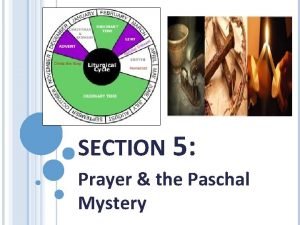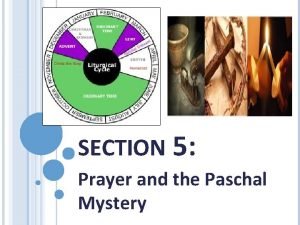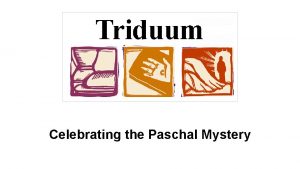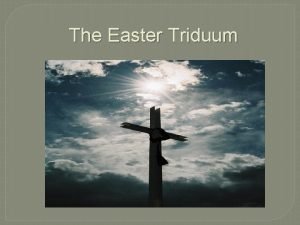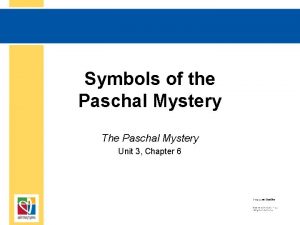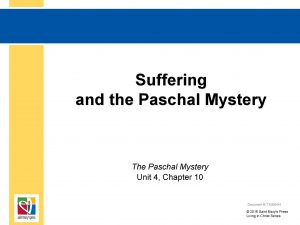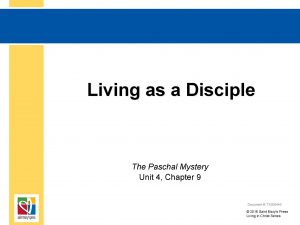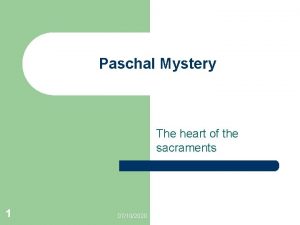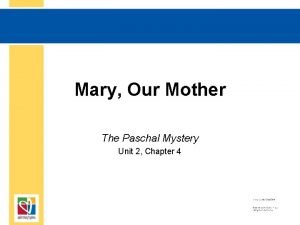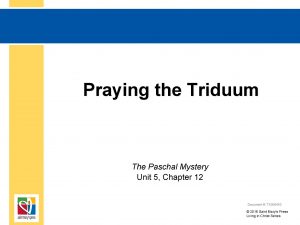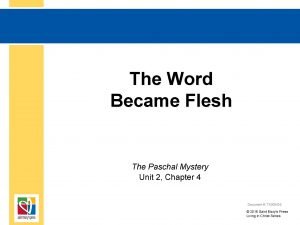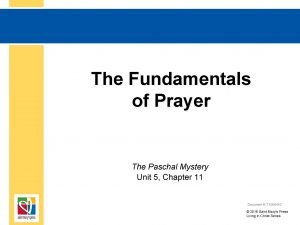Ch 8 Living the Paschal Mystery A Call























- Slides: 23

Ch. 8: Living the Paschal Mystery: A Call to Holiness

• Who are some people you consider to be holy? • What does it mean to be “holy”?

The Light of Christ • Something is holy by virtue of being related to God. • Our call to holiness (i. e. to be saints) is a vocation given to us by Jesus himself. • A mark of holiness is to let Christ’s light shine through in our lives.

Living a Life of Virtue • For our part, we can accept the grace of Redemption God offers us by: – repenting of our sins – believing in the Gospel – living a life of holiness • We grow in holiness in two ways: 1. living a life of virtue 2. cooperating with God’s graces

Virtues • The habitual and firm disposition to do good— the meaning of living a life of virtue—empowers us to perform good acts and give the best of our lives. • The opposite of a virtue is a vice, a bad habit that is acquired by repeated sin in violation of proper norms of morality.

The Human Virtues • Human virtues (aka moral virtues) are virtues we can acquire by human effort. • The cardinal virtues—prudence, justice, fortitude, and temperance—are the source of the other virtues.

Prudence • Helps us decide responsibly • Equated with common sense and wisdom • Use of memory, foresight, imagination, and openness to learning to discover the right course of action in every situation

Justice • Giving due to God and neighbor • The four types: – commutative: regulates relationships of exchange between individuals and social groups – distributive: seeks fair distribution of the goods of creation – legal: governs what individuals owe society as a whole – social: applies the Gospel message of Jesus Christ to the structures, systems, and laws of society

Fortitude • Courage to conquer fears—even the fear of death—for a worthy cause • The ultimate example of fortitude it martyrdom, dying for one’s faith

Temperance • Virtue of self-control • Three parts: – abstinence: tempers our desires for food and other pleasure-producing substances – sobriety: moderates our desires for alcoholic beverages – chastity: helps us control our sex drive in a way that fits our state in life

The Theological Virtues • Faith, hope, and charity (love) • They are infused into our souls directly by God • The Triune God is their origin, motive, and object

Faith • Makes it possible for us to commit totally to God • Must be lived and strengthened through practices like: – – – prayer reading Scripture celebrating the sacraments studying the faith drawing on the faith of friends put faith into action: • corporal works of mercy and • spiritual works of mercy

Hope • Allows us to desire the Kingdom of Heaven and happiness in eternal life • Christ’s own life is a model of hope

Charity • Allows us to love God for his own sake and our neighbor as ourselves for the love of God • The “mother of virtues” and the only virtue that lasts into eternity • Jesus by his words and deeds teaches that charity involves: – obedience – reverence – sacrifice

God Helps Us Grow in Holiness • Growth in holiness is a difficult but not impossible task as long as we rely on God’s help, which includes: – grace – the seven gifts of the Holy Spirit

Grace • Grace is God’s favor, the free and undeserved help that God gives us to respond to the call to holiness • The benefits of grace: – enables us to address God as Abba – adopts us into God’s family – enables us to share in the life of the Blessed Trinity – makes us heirs of Heaven – enables us to live as God’s sons and daughters as Jesus taught – unites us to our Lord and Savior, Jesus Christ

• Sanctifying grace is the free and undeserved gift that God gives to us that blesses us in many ways and helps us to grow in holiness • Distinguished from: – actual graces: God’s intervention at the beginning of conversion or in the course of sanctification – sacramental graces: specific gifts that come from particular sacraments – graces of state: help God gives to particular ministries in the Church – charisms: special gifts that the Holy Spirit gives to individual Christians to build up the Body of Christ

The Seven Gifts of the Holy Spirit • Help us to live Christ-like lives • Given to us at Baptism and Confirmation The Seven Gifs of the Holy Spirit: • wisdom: looking at reality from God’s point of view • understanding: ability to uncover the deeper meaning of faith and the mysteries of God’s magnificent creation • knowledge: grace to see how God is working in our lives, especially in moral decisions

• counsel (right judgment): ability to form our conscience in light of Church teaching • fortitude (courage): strength to follow our convictions in the face of adversity • piety (reverence): respect shown to the Lord through praise and worship • fear of the Lord (wonder and awe): concern about the reality of our sin and to avoid alienation from God

Essential Elements of Holiness • We are able to grow in holiness as members of Christ’s Body in three general ways: – practicing the virtue of charity – celebrating the sacraments – picking up the cross and following Jesus

• Created in his own image, God gave humans the capacities needed to be holy and to share in his own life: – Human reason: power to discern with our intellects the laws God put into creation – Free will: capacity to choose among alternatives and to use God-given talents to cooperate freely with God’s grace – Conscience: capacity to distinguish between good and evil in an act that one is going to perform, in the process of performing, or has already completed – Formation of conscience is a lifelong process

An upright conscience recognize three sources of morality: 1. the object chosen: the matter of our actions/ what we do 2. the end or intention: the purpose for doing something 3. the circumstances: secondary factors surrounding the action (e. g. time, place, method of performing the act)

• Every person is obliged to follow his or her own conscience. • However, sometimes conscience can be mistaken, so we must always aim to strengthen it. • Following a wellformed conscience and making a moral choice based on it is an opportunity for growth in holiness.
 Chapter 7 redemption through the paschal mystery
Chapter 7 redemption through the paschal mystery 3 paschal mystery
3 paschal mystery Paschal mystery prayer
Paschal mystery prayer Paschal mystery definition
Paschal mystery definition Paschal mystery quotes
Paschal mystery quotes Paschal mystery prayer
Paschal mystery prayer Paschal meaning
Paschal meaning Meaning of tridum
Meaning of tridum The color of sunday of the year is green a sign of hope.
The color of sunday of the year is green a sign of hope. Protective put
Protective put Stock options terminology
Stock options terminology Gartner call recording magic quadrant
Gartner call recording magic quadrant Is tomato living or nonliving
Is tomato living or nonliving Smallest living unit of life
Smallest living unit of life Living non living dead
Living non living dead Ecosystem living and nonliving things
Ecosystem living and nonliving things Sơ đồ cơ thể người
Sơ đồ cơ thể người Thế nào là số nguyên tố
Thế nào là số nguyên tố đặc điểm cơ thể của người tối cổ
đặc điểm cơ thể của người tối cổ Mật thư anh em như thể tay chân
Mật thư anh em như thể tay chân Các châu lục và đại dương trên thế giới
Các châu lục và đại dương trên thế giới Tư thế worms-breton
Tư thế worms-breton ưu thế lai là gì
ưu thế lai là gì


